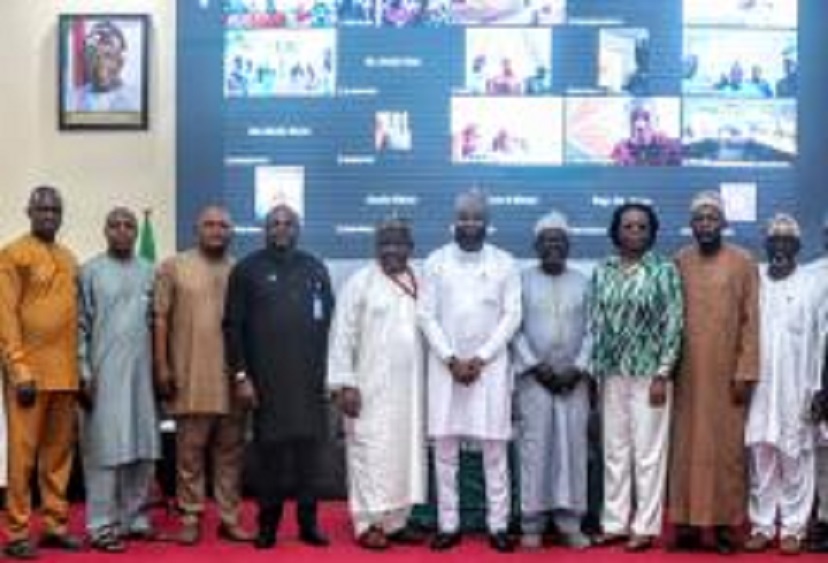Telecom
Halilu Assures BPSR of NASENI’s Delivery on its Mandate

Mr. Khalil Suleiman Halilu, Executive Vice Chairman/Chief Executive Officer (EVC/CEO) of the National Agency for Science and Engineering Infrastructure (NASENI) has assured the Bureau of Public Service Reforms (BPSR) that the Agency would deliver on its mandate of transforming Nigeria’s technology and innovation landscape.

Left to Right: Principal Data Officer, Bureau of Public Service Reforms (BPSR), Mr. Goodluck Ayerota ; Ag. Head, Strategic Communications BPSR, Mr. Aliyu Umar; Principal Admin Officer, BPSR, Mr. Anthony Asemah; SAT Desk Officer, BPSR, Mr. Felix Izenyi; the Director General, BPSR, Mr. Dasuki Ibrahim Arabi; the Executive Vice Chairman/CEO, National Agency for Science and Engineering Infrastructure (NASENI), Mr. Khalil Suleiman Halilu; Director of Finance and Accounts, NASENI, Mr. Jibrin Rajab Haske; Coordinating Director,. Planning and Business Development, NASENI, Mrs. Nonyem Onyechi and Coordinating Director, Science Infrastructure, NASENI, Prof. Umar Ibrahim Gaya during the opening ceremony of the mandatory deployment of self assessment tools (SAT) at the NASENI Headquarters, Abuja on Monday, 12th February, 2024
The EVC/CEO stated this at the opening ceremony of a two-day staff training of NASENI by the Bureau, led by its Director-General, Mr. Dasuki Ibrahim Arabi for the mandatory deployment of Self-Assessment Tools (SAT) for service delivery at the Agency’s Headquarters in Abuja, on Monday January 12, 2023.
Halilu reaffirmed the commitment of the Agency in fulfilling its mandate by maintaining a steadfast focus on NASENI 3Cs principles of Collaboration, Creation, and Commercialization through harnessing the power of technology, human skills and talents to deliver remarkable benefits to Nigeria on multiple fronts.
According to EVC/CEO, in order to carry out NASENI’s Mandate effectively, it is crucial to conduct a thorough assessment of the performances in line with best practices. “This tool enables organizations to evaluate themselves comprehensively, gaining insights into how effectively they are meeting their goals.
“BPSR has employed a participatory focus group approach as the methodology for this tool, making it accessible to individuals across all levels of the Public Service,” he said, while encouraging all participants to give their undivided attention and make the most use of the opportunity for self-assessment and growth.
He said NASENI stands to gain significant advantages from the implementation of SAT by identifying its strengths and areas for improvement, enhancing professional practices, encouraging partnerships with esteemed organizations, creating opportunities to celebrate growth, developmental achievements, and skill acquisition, among other benefits.
In his remarks, Mr. Arabi said BPSR initiated the tools for Self-Assessment, monitoring and evaluation of reforms in Ministries, Agencies and Departments (MDAs) of the Federal Government for effective service delivery.
While buttressing on the mandates and directives of the Federal Government to BPSR to carry out reforms on all the MDAs, he noted that SAT is for the purpose of planning, accountability and management of public funds and to ensure that the system is corrupt-free especially in financial transactions.
He, however, called on NASENI as a Government Agency to embrace SAT in all its dealings and ensure that they own their work to deliver effectively as the EVC/CEO is only in the system to guide them.
Telecom
FG Expands 3MTT Programme Across the Country

Dr Bosun Tijani, Nigeria’s minister of communications, innovation, and digital economy, has revealed that the federal government’s 3 Million Technical Talent (3MTT) programme has trained over 135,000 citizens as it moves from pilot to national level.

Tijani announced this in an update on the program’s success, stating that the beneficiaries were trained in three batches.
He also stated that the initiative’s community-based learning tools had provided over 300,000 extra learners with access to digital skills training across the country.
According to the minister, the program has also enabled the creation of about 15,000 job, entrepreneurship, and career development in Nigeria’s developing digital economy.
He further revealed that more than 1.8 million Nigerians are currently in the 3MTT pipeline, as the government works toward its target of equipping three million citizens with in-demand digital skills aligned with local and global labour market needs.
As the programme enters its scale-up phase, Tijani said the government’s focus will shift toward deepening impact rather than just expanding numbers.
Key priorities, he explained, include strengthening the 3MTT alumni community, widening access to economic opportunities and ensuring that skills acquired through the programme translate into measurable outcomes such as jobs, business creation and innovation.
To support this phase, the federal government has introduced the #3MTTImpactChallenge, an initiative aimed at assessing the programme’s real-world impact
Through the challenge, fellows and partners are invited to share personal stories on how 3MTT has shaped their professional journeys as part of a National Impact Reflection exercise.
Participants are expected to share their experiences across social media platforms, with selected winners set to receive prizes including laptops, e-tablets, data bundles and other incentives.
Telecom
MTN Foundation Trains 2,000+ Young Nigerians in ICT for SME Growth

MTN Foundation has kicked off the seventh phase of its ICT business skills training programme, targeting more than 2,000 entrepreneurs, mostly from Nigeria’s small and medium-scale enterprises (SMEs), in support of the Federal Government’s National Digital Economy and SME Development agenda.

MTN Foundation
The virtual training’s first week ran from Monday, January 5, to Friday, January 9, 2026. It equips small business owners and aspiring entrepreneurs with simple digital tools to shift from paper-based operations to efficient, productivity-boosting systems.
Business analyst Babajide Jolaolu-Kehinde, moderated by Temiloluwa Oyekanmi, programme and partnerships lead, introduced the SWOT framework—Strengths, Weaknesses, Opportunities, and Threats—to guide participants in assessing and improving their businesses.
Jolaolu-Kehinde stressed digital record-keeping, online payments, and customer data tracking for measurable growth, aligning with government efforts to formalise SMEs. “Hope is good, but action and systems make growth happen,” he said.
Trainers showcased real-world examples: traders using handwritten ledgers expanded reach via WhatsApp Business, online marketplaces, and spreadsheets; others grew by accepting mobile transfers over cash and digital orders to tap distant markets.
Manual operations limit sales visibility and customer insights, experts noted, while digital tools deliver real-time data, cut errors, and unlock broader markets.
Participants must adopt at least one digital tool post-onboarding, with organisers promising follow-up workshops and mentorship. The four-week programme aims to bolster SME growth and Nigeria’s economic goals.
Telecom
Spacecoin Secures Licenses to Roll Out Satellite Connectivity in Nigeria, Kenya

Spacecoin, US-based, has announced the signing of recent agreements with local authorities and operators to launch satellite connectivity pilot projects in Africa.

The initiatives, focused on Kenya and Nigeria, aim to serve areas where terrestrial networks remain limited or unavailable.
n Kenya, Spacecoin has obtained a transmission license from the Communications Authority, allowing it to test satellite-based solutions for connectivity and Internet of Things (IoT) monitoring, particularly in rural and peri-urban areas with limited internet access.
According to the Kenyan regulator, internet penetration remains below 50% of the population, despite mobile penetration exceeding 130%.
In parallel, the company is continuing operations in Nigeria under an existing license issued by the Nigerian Communications Commission (NCC).
This authorization supports initiatives aimed at delivering affordable broadband connectivity to isolated and underserved communities.
Spacecoin’s approach is based on a decentralized satellite network using nanosatellites in low Earth orbit (LEO).
Combined with blockchain-based protocols, this architecture is intended to offer more flexible and cost-effective connectivity services than traditional networks, while also enabling the integration of IoT solutions for a range of uses, from smart agriculture to infrastructure monitoring.
These projects are part of a broader strategy to help narrow Africa’s digital divide, where a significant share of the population still lacks access to reliable internet services.
Satellite technology is increasingly viewed as a complement to terrestrial infrastructure, particularly in hard-to-reach areas where deployment costs and geographic constraints remain high.
Beyond Africa, Spacecoin is also running pilot projects in Asia, working with local partners to test the viability of its model across different regulatory and geographic environments.
According to the company’s management, growing interest from regulators reflects a shift toward solutions capable of reaching populations that have long been excluded from internet access.

 General News2 days ago
General News2 days agoCybersecurity Firm Detects a Wave of Crypto Phishing Following BlockFi Bankruptcy

 News2 days ago
News2 days agoIMF Upgrades Nigeria’s 2026 Growth Projection to 4.4%

 Telecom2 days ago
Telecom2 days agoNCC Unveils Spectrum Roadmap to Power Nigeria’s $1tr Digital Economy

 General News2 days ago
General News2 days agoFG Rejects Northern Elders’ Gold Refinery Siting Claim

 Telecom2 days ago
Telecom2 days agoNCC Gives Amazon’s Kuiper, BeetleSat Nod to Provide Satellite Broadband Services in Nigeria

 News2 days ago
News2 days agoNew Horizons Invests N50m to Empower Almajiris with Skills

 E-Financial2 days ago
E-Financial2 days agoKongaPay K-Save Users Save over N3.2Bn

 Telecom2 days ago
Telecom2 days agoSophos Unveils Workspace Protection for Hybrid Workforce and AI Risks



























